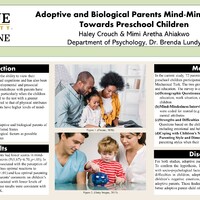Adoptive and Biological Parents Mind-Mindedness Toward Preschool Children
Item
Poster Number
20
Poster Title
Adoptive and Biological Parents Mind-Mindedness Toward Preschool Children
First Presenter
Haley Crouch
Other Contributors
Mimi Aretha Ahiakwo
Abstract
Mind-Mindedness (MM) in parents is the ability to view their children as having mental and emotional cognitions and has also been linked to improvements in various developmental and prosocial outcomes. Previous studies on mind-mindedness with parents have used a ‘describe your child’ interview, particularly when the children are in preschool. If the parents respond to the test with a greater proportion of mental attributes (e.g, cunning) compared to that of physical attributes (e.g, height) or behavioral attributes (e.g, shy), then the parents have higher levels of mind-mindedness. There was a recent study done in the UK following a similar hypothesis that included adoptive parents of children (mean age=9 years; mean adoption age; 3.3 years) showing significantly lower levels of mind-mindedness compared to those of biological parents to children of similar ages. The purpose of the present research is (a) to explore mind-mindedness in adoptive and biological parents of preschool children who reside in the U.S., and (b) to examine various socio-psychological factors as possible correlates of mind-mindedness measures. Based on the previous research conducted in the UK, adoptive parents were expected to score lower on mind-mindedness measures compared to the biological parents. It was also hypothesized that decreased levels of mind-mindedness, particularly in adoptive parents, would be associated with higher percentages of behavioral difficulties in children, and less optimal parenting styles (i.e., in terms of parents' reactions to children’s negative emotions, and parenting styles), compared to parents higher in mind-mindedness. In the current study, 72 parents (42 biological, 30 adoptive) of preschool children participated in an online survey using Amazon’s Mechanical Turk. The two groups were comparable in terms of age and education. The survey comprised of a (a) demographic questionnaire (b) mind-mindedness ‘describe your child” measure, (c) Strengths and Difficulties Questionnaire (Goodman, 1997), (d) Coping with Children’s Negative Emotions Scale and Parenting Style and Dimensions Scale. The results showed that adoptive parents had lower scores in mind-mindedness compared to biological parents (F(1,67)=6.70, p<.01). In addition, low mind-mindedness was associated with the perception of behavioral difficulties (r=.45, p<.01), less optimal reactions to children’s negative emotions (r=41, p<.01) and less optimal parenting style (r=-.58, p<.01). Also, adoptive parents’ comments on children’s pre-placement circumstances were associated with lower levels of mind-mindedness (r=-.41, p<.01). These results were consistent with the previous study conducted in the UK. For both studies, adoptive parents scored low in mind-mindedness. Furthermore, low levels of mind-mindedness were associated with less optimal parenting practices. These findings may prove instrumental in fostering better adoptive parent-child relationships.
Year
2022
Embargo
no embargo
